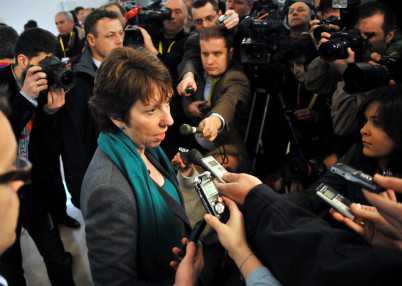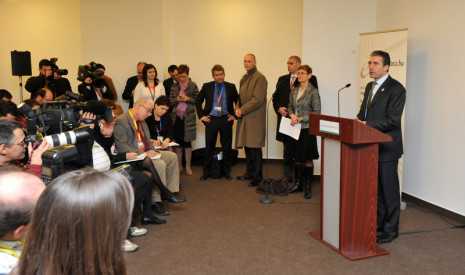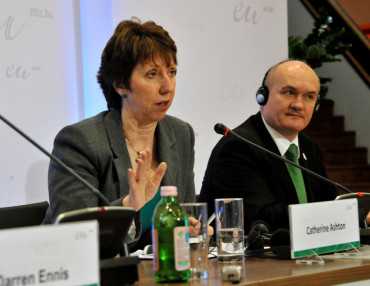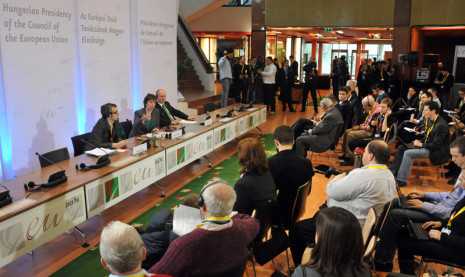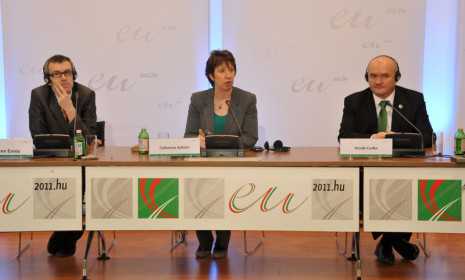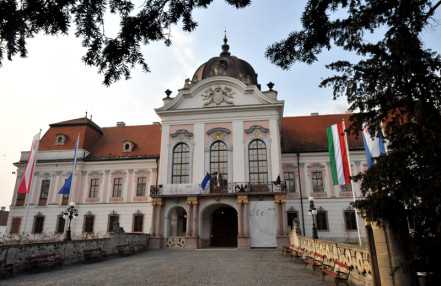Informal Meeting of EU Defence Ministers in Gödöllő
Szöveg: György M Tóth | 2011. február 28. 15:57As regards the situation in Libya, ongoing negotiations are playing a major role at the moment, since the community of nations committed to peace and democracy must carefully consider how they can help putting an end to the crisis that has escalated in the African country Catherine Ashton, EU High Representative for Foreign Affairs and Security Policy said at a press conference on Monday, February 25, following the Informal Meeting of EU Defence Ministers in Gödöllő.
Lady Ashton’s nice gesture was followed by strong words, because the events taking place in Libya necessitate a decision in the present hopeless-looking situation as to what kind of measures the community of nations should take in order to calm things down. Ms. Ashton’s meetings with high-level diplomatic circles had focused on the analysis of the steps necessary for containing the violence. Sanctions are effective only if they are unanimously supported by the international community, the High Representative said.
At the press conference it was also revealed that there still are some 2,000 EU citizens in the region; some of them have dual citizenship and would stay, while the evacuation of the rest of them is the most important task to be carried out in the coming days/hours. As a example of cooperation, Lady Ashton mentioned that there is already a French observer ship off the coast of Libya.
International organizations are holding a series of negotiations on sanctions that might be imposed pointed out the High Representative. One thing is certain: if we want to act effectively, we must make thorough preparations and take a carefully selected course of action to achieve that the political elite of the country stop the violence in return.
Lady Ashton noted once again that the time has come for ongoing negotiations and the joint action of international organizations – at least this is what the situation was calling for on February 25.
NATO Secretary-General Anders Fogh Rasmussen, who also attended the meeting, heavily criticized the current situation in Libya. He said that the killings and brutality give us serious cause for concern, and that the most important thing is to protect people’s lives.
At the press conference, Hungarian Defence Minister Dr. Csaba Hende was the first to address representatives of the press. He said the meeting was in some respect the ‘first’ one for the High Representative and himself as well it was the first time he was hosting a meeting of EU defence ministers and it was the first time Lady Ashton was chairing a ministerial conference as High
The Defence Minister underlined once again that with the adoption of the Lisbon Treaty, the High Representative is fully responsible for foreign and security policy issues, as well as for the matters of the related field of defence policy. Needless to say, as a good supporting president, Hungary, the MoD and the Ministry for Foreign Affairs have provided assistance in every field to the preparation of the key topics of the meeting.
At the press conference Dr. Csaba Hende said that “Defence Ministers have discussed the EU’s ongoing operations at the working dinner. The most important one, Operation ALTHEA in BosniaHerzegovina, and the future of the EUFOR have also been high on the agenda of the talks.
This issue takes priority because the operation has arrived to a turning point, since the UN mandate will expire in November."
This means that the EU member states have to decide whether to maintain ALTHEA’s presence as an executive force, or else, they should find the ways to transform EUFOR into a force with mentoring/training, advisory, or some different capability. Various options have been explored at the meeting. In general we can say that none of the member states have expressed their intention to deploy more troops to the mission.
Click on our gallery for more pictures!
Photo: László Tóth
